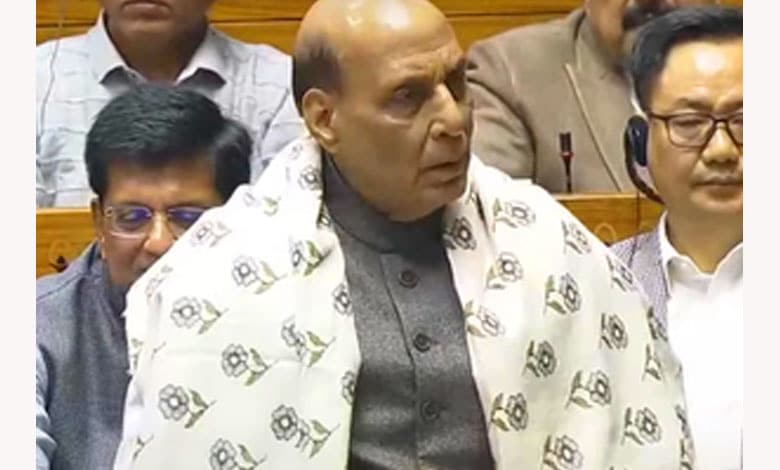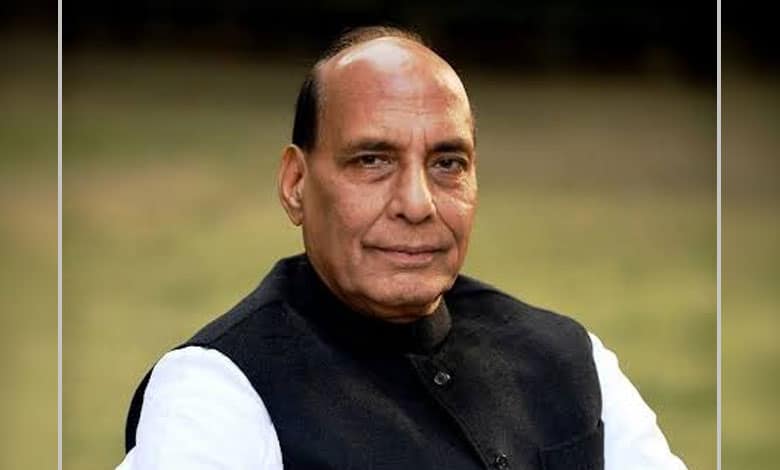India’s Defence Exports Soar from Rs 2,000 Cr to Rs 21,000 Cr in 10 Years: Rajnath Singh
India's defence exports have surged from Rs 2,000 crore to Rs 21,000 crore in the past decade, says Defence Minister Rajnath Singh. The government aims for Rs 50,000 crore in defence exports by 2029, highlighting growth in self-reliance and global military influence.

Mhow: India’s defence exports have achieved a remarkable surge, growing from a modest Rs 2,000 crore to an astounding Rs 21,000 crore in just ten years, according to Defence Minister Rajnath Singh.
This growth marks a significant achievement in India’s defence sector, reflecting the country’s increasing capabilities in both military technology and self-reliance in defence production.
Table of Contents
While addressing officers at the Army War College (AWC) in Mhow on Monday, Singh revealed that the government has set an ambitious target of Rs 50,000 crore for defence exports by 2029.
The defence minister’s comments came amid ongoing efforts by the Indian government to boost self-reliance under the Aatmanirbhar Bharat (Self-Reliant India) initiative, emphasizing the importance of strengthening India’s domestic defence industry to reduce dependency on foreign imports.
Surge in Defence Exports: A Testament to India’s Growing Capabilities
The significant jump in defence exports from Rs 2,000 crore to Rs 21,000 crore over the past decade underscores India’s growing prowess in the global defence market. India has increasingly become a key player in the global arms market, with enhanced capabilities in the production of advanced military equipment, technology, and systems. This growth not only strengthens India’s defence sector but also supports its strategic partnerships with other countries.
Defence Minister Rajnath Singh noted that India’s focus on self-reliance, particularly in the defence sector, is transforming the country into a formidable player on the global stage. The growth in defence exports reflects India’s intent to strengthen its military capacities and secure its place as a dominant economic and military power in the coming years.

Modern Warfare and Technological Advancements
Addressing the officers at the Army War College, Rajnath Singh also spoke about the evolving nature of warfare. He highlighted the need for the armed forces to be equipped and trained to face the modern challenges posed by unconventional warfare methods, such as information warfare, artificial intelligence (AI)-driven combat, proxy warfare, electromagnetic warfare, and cyber-attacks. These technological advancements in warfare represent a new era of conflict where traditional military methods are increasingly supplemented by cutting-edge technology.
The defence minister emphasized that the Indian military must continuously adapt to these changes, ensuring that soldiers are equipped with the skills and tools necessary to counter these modern threats. He praised the role of training institutes in Mhow for their contributions in constantly evolving their training curriculum to meet the needs of contemporary warfare, thereby ensuring that military personnel are prepared to tackle every challenge effectively.
Enhancing Integration Across Defence Services
Minister Rajnath Singh stressed the importance of integration across the three services of the Indian Armed Forces—Army, Navy, and Air Force. He urged the officers at the AWC to promote synergy between different branches of the military, especially through the integration of technologies such as AI and communication systems. By strengthening cooperation and joint operations, the Indian military will be better prepared to respond to diverse threats more efficiently and cohesively.
Singh emphasized that the Modi government is committed to strengthening jointness among the three armed forces, ensuring that they are able to face challenges together in a unified and strategic manner. This integration will significantly enhance the operational capabilities of India’s military in the years to come.
Focus on Self-Reliance and Strengthening Defence Diplomacy
As part of India’s growing role on the global stage, Singh also discussed the importance of defence attaches in promoting India’s national interests abroad. He highlighted that these officers should embody the vision of Aatmanirbhar Bharat, which seeks to strengthen India’s domestic defence industry and expand its influence internationally. Defence attaches play a critical role in advancing India’s strategic relationships and ensuring that the country’s defence interests are well-represented in foreign affairs.
The defence minister further emphasized that India’s prosperity and security are intrinsically linked. A robust economy is essential for strengthening the country’s defence capabilities, and a strong defence sector in turn contributes to economic stability. Singh noted that India’s economic and military growth should go hand in hand, with both sectors complementing and supporting each other.
Also Read | Rajnath Singh: Protecting India’s Culture Is as Crucial as Securing Its Borders
The Role of Armed Forces in National Security and Disaster Response
Rajnath Singh lauded the role of the Indian Armed Forces in safeguarding the country’s borders and acting as the first responders during natural disasters. The Indian military’s ability to respond swiftly and effectively during crises has earned it widespread respect and admiration. Singh commended the armed forces for their dedication to national security and their invaluable contributions to disaster relief operations.
The defence minister’s visit to the Army War College also included a briefing by AWC Commandant Lt. Gen. HS Sahi, who provided insights into the institute’s role in training military leaders for a wide spectrum of conflict scenarios. Singh was informed about the college’s efforts to infuse technology into training curriculums and its collaborations with academia, universities, and industries, aimed at enhancing the military’s overall capability.
Promoting Global Military Diplomacy and Training Collaboration
The Army War College has also made significant strides in enhancing India’s global military presence through its training programs for officers from friendly countries. This initiative has not only contributed to India’s military diplomacy but has also solidified its standing as a respected global defence partner. By training officers from across the world, India is strengthening its military ties and fostering goodwill on the international stage.
During his visit, Singh paid homage to the brave soldiers at the Infantry Memorial and laid a wreath to honor their sacrifices. Chief of the Army Staff General Upendra Dwivedi and other senior officials of the Army were present to witness the event.
India’s Path to Becoming a Global Military Power
With the government’s strategic focus on defence self-reliance, technological advancements, and global military diplomacy, India is well on its way to becoming one of the strongest economic and military powers in the world. Rajnath Singh’s remarks reinforce the vision of a robust, self-reliant India that is not only capable of defending its borders but also contributing significantly to global peace and security. The rise in defence exports is just one of many indicators of India’s growing military strength and its commitment to safeguarding national interests in an increasingly complex global environment.
